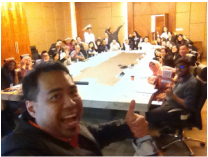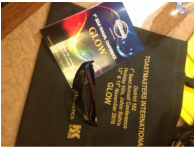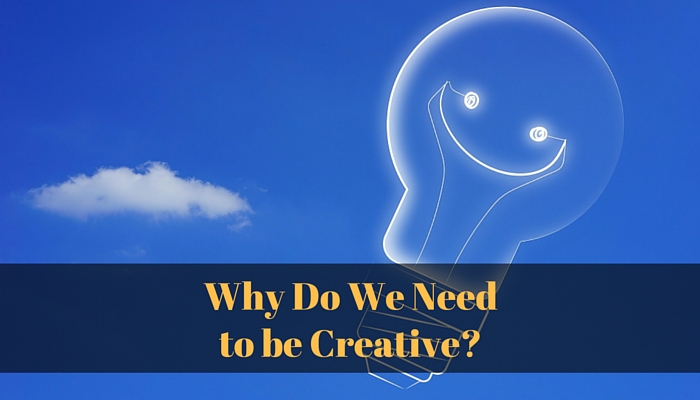|
7 Touch Points to Transform Your Next Presentation into a Performance
If you are running a corporate workshop, doing a business presentation, or sharing an information with the audience, it is key for your presentation memorable; only then the audience will find value to your presentation. To be memorable, your presentation needs to bring the audience into a journey of experiences. Here are 7 Touch-points that you might need to take note of so that you can create an experience for your audience in your presentation: 1) Pre-Presentation Ambience Before the audience arrive, pre-set the room with good lighting and play suitable music to create a nice ambience. Think like a 5-star hotel lobby. 2) Start with simple and good ice-breakers Warm the participants with a story or anecdotes. Human loves to listen to stories. Include simple activities that get the whole room to participate. Simple but good (not the ones that sabotages audience!). Let them loosen up. 3) Make Your Presentation Simple and Easy to Follow You may have all the content, but not everything can be digested in one presentation sitting. Do the audience a favour. Prioritise your contents and present the most important ones first. Don't rattle. 4) Use gestures When we speak to our close friends, we use gestures. It is only natural. Use the appropriate gestures when you present. 5) Maximise The Stage If you have the luxury of a large presentaion space, use them to your advantage. Move across the room deliberately as your present. This creates unconscious engagement with the audience. 6) Use humour or play Use humour where appropriate. This will get the audience to laugh and enjoy your presentation. Alternatively, plant activities that require the audience to play. This in itself could be a humour and triggers enjoyment. 7) Rehearse and obtain feedback Some of my contacts shared with me that they can present well without rehearsals and practise. And I would respond with "You can definitely create a more wonderful presentation for your audience when you rehearse." When you rehearse (and get someone to observe and provide feedback), it gives you the opportunity to improve certain areas of your presentations. This is because, feedback is the breakfast of champions. The ultimate results: The audience benefits from your presentation; and you look good as a presenter. Hope this tips help you as you prepare for your next presentation. Remember, don't make your next presentation just like any other presentation. Transform your presentation into a performance. Towards your continued success, Hazriq Idrus Business Creativity & Speaking Strategist Author of 3 books, including "The Stage Fright Antidote" Founder, The Speaking Factory Pte Ltd Hazriq Idrus is Asia's Trusted Business Creativity and Speaking Strategist. He founded The Speaking Factory Pte Ltd with a mission to empower corporate professionals maximise their potentials and performance at the workplace. Hazriq is also the author of The Stage Fright Antidote and co-authored three other books. If you would like Hazriq to speak at your organisation, or would like to attend Hazriq's executive coaching sessions on presentation skills, please contact (65) 6100 2306 or send an email to [email protected] to check his availability.
0 Comments
In order to be creative, we need to be in a state of positive mind. The more positive we are, the more easier ideas will flow so we can use them to solve our challenges.
One of the ways to have a positive mindset is to have a habit of complimenting others and make them look good; and do it sincerely, of course! This is because, when we offer someone a compliment (or help, or donation etc), we will have this nice and positive sense of accomplishment. In my creativity workshop, I will have this segment where every delegate is required to choose a partner, then write a letter to compliment or commend each other. After writing their "love letters", and upon receiving the cue, the delegates will move to their partners, exchange the letters and start reading them. Each time when this exercise is done, the outcome is phenomenal. The whole room starts to fill with positive vibes; seeing smiles and laughters. When it's the delegates' turn to share in class on their experiences receiving such letters, some of them really cried; because they have never received such honest and encouraging words from someone else before. The positive words made their day. At this juncture, when we are in a positive and jovial mood, is a good time to brainstorm for ideas. Ideas will just keep flowing. So, when was the last time have you received a bunch of emails, or letters, that consists of compliments from someone? If you have, congratulations! If you haven’t, try writing or sending someone a letter of compliment instead. This positive vibe that you exude, will come back to you (Law of Reciprocity); and most of the time, when you least expect it. Towards your continued success, Hazriq Idrus Business Creativity & Speaking Strategist Author of 3 books, including "The Stage Fright Antidote" Founder, The Speaking Factory Pte Ltd Tel: (65) 6100 2306 Email: [email protected] Web: www.thespeakingfactory.com Hazriq Idrus is Asia's Trusted Business Creativity and Speaking Strategist. He founded The Speaking Factory Pte Ltd with a mission to empower corporate professionals maximise their potentials and performance at the workplace. Hazriq is also the author of The Stage Fright Antidote and co-authored two other books. If you would like Hazriq to speak at your organisation, or would like to attend Hazriq's executive coaching sessions on presentation skills, please contact (65) 6100 2306 or send an email to [email protected] to check his availability. I just came back from Johor Bahru, Malaysia a few weeks back to speak a conference (Saturday 12 Nov 2016) for members of the Toastmasters community. Honoured to be invited share excerpts from my book, "The Stage Fright Antidote!". At the conference, I asked the delegates if they "recce" the stage before they take the stage and speak. Only about 20% raised their hands. I recommended the rest of them to do so in their next presentation.
The plus point of doing a "recce" (or in theatre terms, I call it "feel the space"), is to feel relaxed before your presentation and to get comfortable with the presentation area. One of the ways to do that is to familiarise the stage. For presenters and speakers, the stage is the "playground". When we are comfortable with the playground, we will be even more motivated to present and share with the audience. The results of doing that: The audience will see your passion and energy in your presentation. And that will rock the room. If this is not a habit yet, I would recommend you to start doing it. Before your next presentation, come to the venue early. Walk on the stage, cover each inches. If there are steps, use it. Feel the space. Look for obstacles on stage and identify their locations. Also, from where you are on stage, look at the audience' seats, identify if there are angles which you are not able to see the seats; because if you can't see the seats, chances are that person sitting there won't be able to see you too. Keep walking and "feel the space' until you are feeling comfortable with it. Do this action and you will notice that your confidence will shoot up; and your presentation will improve. Hazriq Idrus Author, The Stage Fright Antidote! Founder, The Speaking Factory Pte Ltd ~ Hazriq Idrus is a Business Creativity and Speaking Strategist. He is the author of "The Stage Fright Antidote and co-authored two other books. Hazriq founded The Speaking Factory Pte Ltd with a mission to empower professionals maximise their potentials, performance & productivity at the workplace through his signature high-energy, transformational theatre-based & experiential corporate training programmes. Had just ended the Day 1 of StoryDrive Asia - The Singapore Publishing Symposium at the Arts House. A good event to learn and to rub shoulders with top experts in the industry. One of the session the organiser conducted was the 'speed-dating' where we had chance to meet with potential partners.
Speed-dating is a very good platform for you to widen your network. Here is a 5-Step Business Speed-Dating tips you can apply at this platform (when you are facing 1-to-1): Step 1: Pre-Identify what are your goals (for my case; my top 3 goals would be: (1) to find potential distributors partners, (2) to find potential event/conference planners (so I can work with for future speaking engagements), (3) any other business opportunities that could help bring my business to the next level Step 2: Introduce yourself (prepare your 30 sec elevator pitch). This is where you exchange namecards. Step 3: Offer your help to the other person first. eg " How can I help you meeting your goals/ objectives". If you are not able to meet their objectives, probably you know of someone who could. So, it's still useful. Step 4: After listening their needs, now it's your turn to share with him/ her your needs/ objectives. Step 5: Conclude your conversation, and thank the other person. And remember to drop a follow-up email within 24-48 hours. Hazriq Idrus Author, The Stage Fright Antidote! Founder, The Speaking Factory Pte Ltd ~ Hazriq Idrus is a Business Creativity and Speaking Strategist. He is the author of "The Stage Fright Antidote and co-authored two other books. Hazriq founded The Speaking Factory Pte Ltd with a mission to empower professionals maximise their potentials, performance & productivity at the workplace through his signature high-energy, transformational theatre-based & experiential corporate training programmes. Recently, I had the pleasure to share my business insights with entrepreneur, Ridjal Noor, via his online video platform, "Lions Den With Ridjal Noor". During the session, one of the topics we covered was "Celebrating Failure".
You can view the video here: https://www.youtube.com/watch?v=YmYqADONg70 Today, I'm going to share a little bit more detail on that particular topic. This "Celebrating Failure" is one of the concepts I learnt from theatre improvisation. During theatre rehearsals, we are encouraged to explore the different styles of acting. Even if the outcome is funny, doesn't make sense, or sometimes we made mistakes by appearing out of context, we are forgiven. My director would always say, "That's what rehearsals are for. To make mistakes." The idea behind this concept is that we are trained to be "willing to accept and embrace failure". I found this concept refreshing and I have successfully applied it in the creativity subject I am teaching, as well as daily in my life. I am an advocate of "Celebrating Failures & Mistakes". You see, we, or at least I am, are brought up in a community where 'F' is such a taboo word - Fear of Failure. We are in the constant fear of failure. The fear of making mistakes. Why is that so? This is because when we were in school, we were taught that getting "F" grades in school tests and examination, is a bad thing! My classmates and I would cry if we were to get "C" grades in school, let alone an "F"! We were afraid that our parents would reprimand us. We were afraid that our teachers would scold us. We were afraid that our friends would laugh at us. In another example, when we were in class, when our teachers posed questions for us to answer, none of us would raise our hands to reciprocate. We were so afraid if we provided the wrong answer. These created a mentality that mistakes and failure are something to be avoided. These experiences shaped us. And it it becomes the norm! By embracing this norm, we don't grow as a person. What if we happily embrace failures. Is it wrong? We must understand that we learnt better (and sometimes faster) when we fall and fail. Our brains act like a sponge; if there are any bad experiences that we encountered, we would remember it, sometimes for life. Ralph Heath, in his book, "Celebrating Failures: The Power of Taking Risks, Making Mistakes and Thinking Big", he mentioned that that failures and defeats are life's greatest teachers. In fact, he encouraged leaders in the business world to embrace the power of failure as a learning tool for organisational improvements. I had the opportunity to visit Canada in 2009. My Pakistani friend invited me over as he landed a job with Microsoft in Vancouver. I was so happy for him. Earlier, when each time he brought on the subject of visiting Canada, I would offer several excuses citing my work scheduling. We would still kept in touch, until he mentioned that he was getting married in December that year. I thought that was a perfect reason for me to visit Canada. Imagine having a Pakistani friend, getting married in Canada, during winter? It would be a very interesting experience for me, I felt. So wanting to give him a surprise, I bought the airline tickets (luckily there was a travel promotion and I could settle the tickets at $999!). It was a BIG bargain! I diligently planned my trip, only to find out that his wedding would be in Pakistan! I shared this with my ex-colleague and he gave me a good laugh! I was almost mad. I mean, I already: - Lost the chance to meet up my Pakistani friend - Used up my energy and time preparing for the trip - Spent $999 for the tickets - and its non-refundable because of the promotion All this just because I FAILED to clarify with my Pakistani friend about the wedding. Once my colleague stopped laughing, he advised me to look at the flip-side of things. This reminded me again on the concepts of "Celebrating Failure" in theatre improvisation. By "Celebrating Failure" it pushed me to be into positive thinking mode. I had to do a paradigm shift and think through what I could do to maximise my stay in Canada. After the trip, I realised that I benefited more because of this "FAILURE". Through this experiences, I: - Learnt the importance of clarification, - Got to know that that there was $999 deal to Canada! - Got to visit The Pike Place Market in Seattle, which was famous because it was made into case studies on how happy orgaisations work. The case studies are made into books called "Fish". - Got a chance to attend theatre improvisation shows and workshops at Vancouver Theatresports, something's lacking in this part of the region. - Reunited with my secondary school friend, whom we have not met for 15 years! He had lived in Canada ever since after graduation. In life, when we failed to achieve our targets or experiencing making mistakes, we have to tell ourselves that it is okay to fail. Just do not repeat the same mistake. Have a mindset that we do not just look at that failure as a "failure", instead, look for positives behind it. There will always be positives. My take is to always accept the reality of failure and celebrate it. This is so if the next time you make mistakes and fall, you will be feeling OK. You will feel that you will fall into a 'cushion' because your sub-conscious mind will tell that you have been there and done that. This mindset will frees your energy. It will then allows you to perform to the best of your ability and achieve greater things in life. Towards your continued success, Hazriq Idrus Author, The Stage Fright Antidote! Founder, The Speaking Factory Pte Ltd ~ Hazriq Idrus is a Business Creativity and Speaking Strategist. He is the author of "The Stage Fright Antidote and co-authored two other books. Hazriq founded The Speaking Factory Pte Ltd with a mission to empower operational leaders and line-managers in achieving professional and organisational excellence through his signature high-energy, transformational theatre-based & experiential corporate training programmes. In one of my training workshops recently, I had the opportunity to chat with one of the participants. He was curious as to how "Creativity" can used in Business and Life. He has this mindset that "creativity" is only about being in the "Creative Industries" and doing stuff like painting, sculpturing, stage performances etc.
It was, in fact, a genuine question. He was not alone. True to what most people see, creativity is highly synonymous with the visual and performing arts. While creativity is highly required for that, however, the elements of creativity can be applied in ALL other aspects of life, not just the arts. Like creativity guru, Frederik Haren said, "...there is no such thing as creative industries". Creativity is not just about being in the "creative expression" mode (which I shared in my "Because I'm Introvert" book). We need creativity to live. It is an important skill to have. I call creativity - a form of way of life. Lets look at some of the areas in life as to why there is a need for one to be creative. 1) Creativity solves problems You see, we face with challenges and problems everyday. When face with such adversities, humans have two options - to fight (solve) or to run away. Of course, when we choose to run away, the problems / challenges will "go away" temporarily, but will surface again in future. But if we choose to fight and solve the problems, we might need to know as to how solve them. This is where creativity comes in handy. Creativity is essentially the ability to put two or more different things together to solve a problem. It is also called as Creative-Thinking or Creative Problem Solving. In creative problem solving, the main aim is to address the challenges and solve the problems through a process. Why is there a need for a process? Because that is how our brain is wired. Our brain has been designed to connect things (Will share more on this in one of the ways on how to be creative). For example, I frequently face students turning up late for classes in the polytechnic where I teach weekly . How do we then solve that problem of late-coming? Let's look at another example - you are about to make a presentation but just moments before the presentation starts, there's blackout. How to we respond? Another example; in the current trend, there's a rise in electrical bike accidents. How do we then curb this problem? These are just examples of problems that we need to solve. With creative problem solving, these problems can be easily addressed. 2) Creativity opens doors for career progression and personal development When we are able to solve challenges and problems regularly, that ability will turn into "creativity habits". Our brain will be "re-wired" to think of new ways for ourselves to be better and to move forward. When we embrace that habit, it opens up more doors for career progression and personal development. We start to think along these lines: a) How do we save more and earn more for future? b) How do we avoid repetitive works like data entry; and produce more results? c) How can we spend more quality time with the family? And when we start to think along these lines, it will pave new ways of doing things. It gives a sense of satisfaction and accomplishments. The handphone is a good example of progression. Those were the days when we used dial-up to make calls. Then It progressed into buttons. Then, our favourite "heavy brick-looking-like" handphone. The trend then moved into smaller-built handphone, then moved into smart phones. The trend continues. 3) Creativity encourages positive-thinking, optimism and initiative Creative thinking will transform you from being passive and into a more active role. You will start to feel "responsible" in whatever you are doing and enjoy taking initiatives; thus keep coming up with new ways of doing things. You will then go all out to get them being implemented. In the process, it exudes your positive energy and optimism to get the job done. Failure is not in your dictionary. Famous Bollywood actor Shah Rukh Khan spoke in an interview with NDTV, he shared his late father's advice. His father said, "Success in the worst teacher in the world. It makes you feel invincible but you cannot pass down success to other people....but FAILURE is a fantastic teacher. It teaches you to work harder and be better." Similar thinking went to Thomas Edision, the inventor of light bulb. He said that his light bulb idea was his 10,000th idea. But his earlier 9,999 ideas were not failures, it's just that he found 9999 different ways of NOT inventing a light bulb. In fact, he patented some of his 9,999 ideas. In soccer, there's a famous saying by the Brazilians, "England invented the soccer, but we PERFECTED it." Because the Brazilians are so passionate and optimism, they found new ways to create and perfect the art of playing soccer (think "Samba"), they are one of the successful nations in that sport. How about you? Do you find other reasons and the needs to be creative? Towards your continued success, Hazriq Idrus Author, The Stage Fright Antidote! Founder, The Speaking Factory Pte Ltd ~ Hazriq Idrus is a Business Creativity and Speaking Strategist. He is the author of "The Stage Fright Antidote and co-authored two other books. Hazriq founded The Speaking Factory Pte Ltd with a mission to empower operational leaders and line-managers in achieving professional and organisational excellence through his signature high-energy, transformational theatre-based & experiential corporate training programmes. To be highly skilled in any areas that you do, you need to invest your time in learning. However, learning is not just about attending courses or reading. Based on the learning & development model and research done by Michael M. Lombardo and Robert W. Eichinger, that makes up of only 10% (or 1 of the 3 elements of the model) of the overall learning experiences to meet your true potential mark.
To obtain and maximise your learning experiences so that you can develop a mastery on a particular skill (or skills), Michael and Robert recommended the following, which I have summarised and synthesized below: 1) 2nd Element: Devote 70% learning time by applying the skills and go through the experience itself. For example, if you want to master your presentation skills, keep presenting. When things go wrong, refine and continue presenting. You'll get better each time. 2) 3rd Element: Allocate 20% learning time to obtain feedback from mentors and coaches. If you want to improve on your presentation skills, work with presentation mentors and coaches. These people have gone through the experiences earlier than you and could offer sound advice for you. You can learn from their life experiences and expedite your learning process instead of going through a steep learning curve. Why re-invent the wheel. If any of these learning elements are missing, you'll miss out on reaching your 100% true potential. Hazriq Idrus Author, The Stage Fright Antidote! Founder, The Speaking Factory Pte Ltd ~ Hazriq Idrus is a Business Creativity and Speaking Strategist. He founded The Speaking Factory Pte Ltd with a mission to empower operational and middle-management leaders in achieving professional and organisational excellence through his signature high-energy, transformational theatre-based & experiential corporate training programmes In any presentation, these 3 elements must exist.:
1) People The presence of people (audience) is an important factor before you go up and give your presentations. If there is no audience, there is no need to even put up a presentation! Having said that, it is important to know who your target audience are. You can use this checklist to help you determine your audience. a) Who are they? eg Working adults/ School kids/ Youths? b) What's in it for them listening to your speech? eg increase wellness, reduce debts c) What is the Call to Action for them after your speech? eg buy your books, enrol in your classes, join your emailing list By knowing who your audience are, it will help you prepare your content. 2) Presenter Once you know who are your target audience, you can then prepare your yourself as a presenter. You will have to decide two main factors - your message & the medium of delivery. You can use this checklist below to help you determine your message and medium: Message: a) Is your message going to inform/ educate/ persuade/ inspire the audience? Medium of delivery: b) Are you using slides/videos/ music/ or just you speaking on stage? 3) Place It is important to to know the location and type of room you are going to present. Knowing the place beforehand helps you to prepare your mind and energy. A big space requires you to exude more energy as compared to a smaller venue. You can use this checklist below to help you determine your presentation venue: - Is the presentation going to take place at the expo/workshop room/ seminar room/ on stage/ lecture hall Prior your next speaking engagements, ensure you have these primary information first. Hope these tips help. Towards a successful communications and creative confidence, Hazriq Idrus Author, The Stage Fright Antidote! Founder, The Speaking Factory Pte Ltd ~ Hazriq Idrus is a Business Creativity and Speaking Strategist. He founded The Speaking Factory Pte Ltd with a mission to empower operational and middle-management leaders in achieving professional and organisational excellence through his signature high-energy, transformational theatre-based & experiential corporate training programmes. Occasionally, there will be somebody in the audience who seems to know more than you do - or rather they think they do. This are what I called the "self-proclaimed experts". What can we do to manage these people?
I had my fair share of "self-proclaimed experts" in my workshops. Once in one of my creative problem solving workshops, as soon as I opened the door for the participants to enter, an 50plus year-old man came in. He was one of the first to enter. He went straight to an empty chair and sat down. He looked around the room and started asking me questions. He sounded like an interrogator at first; asking me on my work experiences, how long I have been conducting training and various other kinds of questions. Some tough ones. I chatted with him while providing the answers he asked for. It turned out that he had been in the company for years and would be retiring in a few years' time. That was my cue "win" him over. So here are some tips that you can do if you face audience who are "self-proclaimed experts: 1) Chat and engage small talks with him/ her 2) Find out what are their strengths/ likes etc. 3) Acknowledge and lavishly (and sincerely) praise them on those areas 4) Get them to be on your side 5) Keep the conversations positive and professional throughout More often than not, these steps helped me in managing these situations. And back to the 50plus year-old participant I mentioned earlier, we turned out to be best of buddies during the session. He was very supportive of my presentation, willingly shared his experiences in the company to value-add my points which I shared and willingly offered to volunteer when I needed assistance to do some demonstrations. How about you? Do you face something familiar? Would like to hear from you too. Towards your speaking success, Hazriq Idrus Author, The Stage Fright Antidote! Founder, The Speaking Factory Pte Ltd ~ Hazriq Idrus is a Business Creativity and Speaking Strategist. He founded The Speaking Factory Pte Ltd with a mission to empower operational and middle-management leaders in achieving professional and organisational excellence through his signature high-energy, transformational theatre-based & experiential corporate training programmes. During my coaching sessions or conversations with other people, three concerns about public speaking came up:
1) I'm not trained to be a public speaker. 2) Look above the eyes or at the forehead of the audience. 3) Stand in one place on stage However, these three things are just myths. Let's address each of those: 1. I'm not trained to be a public speaker In actual fact: We all speak in public - IT could be speaking one-on-one with another person, speaking in a meeting, or on stage in front of a large group of people. We are contantly speaking and we present all the time. The only dofference is, we contextualise our delivery to suit the setting; You don't use the mic when speaking to one person, as compared to a large of people, do you? 2. Look above the eyes or at the forehead of the audience In actual fact: We need to look directly at the audience; at least to key individuals. We connect with each other through our eyes because it shows sincerity. By being sincere, it creates a relationship between you as a speaker and the audiende. It will less scary. 3. Stand in one place on stage In actual fact: You do not need to stand in one place during your presentation. You are free to move, roam and be dynamic. In public speaking, we call this "movement with a purpose' or purposeful movement. Purposeful movement can be dynamic and increase energy in the audience; which translate you engaging presentation. Towards your speaking success, Hazriq Idrus Speaking & Creativity Strategist Founder, The Speaking Factory Pte Ltd Author, The Stage Fright Antidote! ~ Hazriq Idrus is a Business Creativity and Speaking Strategist. He founded The Speaking Factory Pte Ltd with a mission to empower operational and middle-management leaders in achieving professional and organisational excellence through his signature high-energy, transformational theatre-based & experiential corporate training programmes. |
About
|








